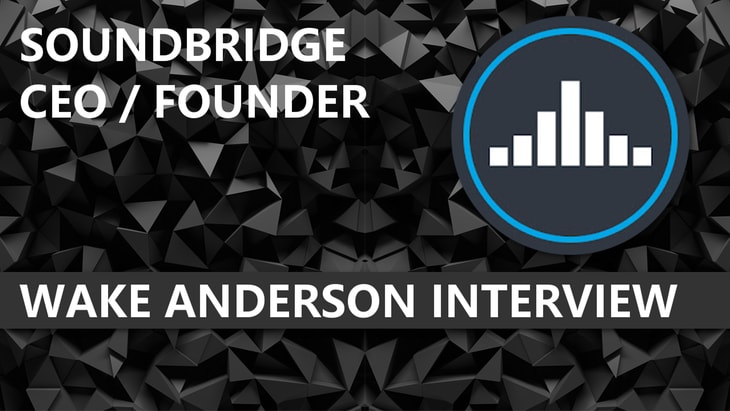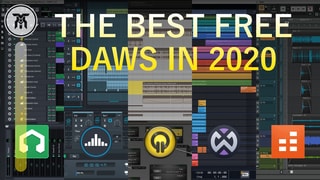Updated: Jan 11, 2020
Share!
SoundBridge Interview - Founder Wake Anderson

This SoundBridge interview with founder/CEO Wake Anderson reveals what it's like behind the business and development of one of the best free DAWs.
Learn a bit about Wake, as well as some advice and takeaways that you can implement if you're a developer or entrepreneur in the audio industry.
Q: Let's start out with an introduction of yourself, your experience, and what you're doing now.
My name is Wake Anderson and I'm the founder and CEO of SoundBridge, LLC. I designed every part of the company's operational infrastructure that allows a team of less than 10 people, working from home, to compete with Apple, Avid, Ableton and other top DAW publishers.
I envisioned and designed every product with the help of a team of professional Psytrance producers from Europe. We just launched SoundBridge 1.11 & RitMix 1.06 and it contains multi-monitor support and tempo automation and a huge list of fixes and optimizations.
In addition to SoundBridge, my teammates and I founded SoundBridgeAcademy.com. We provide the world's most affordable online music production certificate program. The program is $799 and offers over 80+ hours of video lessons taught by Psytrance producer, MODERN8 of Tesseract Studio and Mainstage Records.
It can be financed over 12 months for $79/month and after all of your payments are made, you have lifetime access to the content - something our competitors don't offer for over 20x the price.
Q: What does the future of SoundBridge look like? Is there anything planned for stock synths? What about typing-keyboard to piano?
The future of SoundBridge is determined based on our active users. Shortly, we will be opening up a community forum dedicated to sharing music production knowledge, networking and deciding on future features.
Right now, we are putting a greater focus on user support and building community. We want our users to enjoy the latest builds for a bit, listen and decide what's next.
Typically when we think about "what's next", we prioritize DAW features that musicians need to make the most modern high-fidelity electronic music. Then, we try to focus on how to make that mobile-accessible.
By doing so, we implement the feature in a really intuitive way that's within an arm's reach of the musician. Keyboard typing and being able to bend automation curves between 2 points are two features I believe are next.
A synth is not a priority for us at the moment because today there are a few VSTs for $100 or so that dominate and produce nearly every sound you’ll ever need.
Q: Did you learn anything from creating the MVP (Minimum Viable Product) of SoundBridge and has it influenced how you determine what features take priority?
Yes, in the beginning we tried to document as many essential features of a modern DAW. Then, after we were done implementing those, we found a million other features to add. We learned to take our research phase much more seriously.
RitMix was in a pure conceptualization research phase for about 6 months. We just made primitives and laid out shapes to represent buttons and faders. Describing the functionality and what every parameter did.
We did the same for SoundBridge when rebranding from Lumit. This cut our development time in half.
Q: What supplements your creativity and effectiveness? Do you have any creative outlets or habits that shape your ability to perform? Anything outside of audio/music?
Of course, I have other businesses I run and teach guitar & digital marketing locally in Boston. I read as much as possible, exercise and take my fitness and nutrition extremely seriously.
I’m a Cancer [Zodiac Sign], so I tend to find things to occupy my time. Sometimes it’s overload, but I don’t like sitting still to be quite honest.
Q: What is the biggest takeaway you got from the contrast between your success with SoundBridge and your most unsuccessful project?
There were some moments that I’ve felt unsuccessful, but in hindsight nothing was a failure. Some things have been delayed or taken longer than expected, but I’ve never failed at anything I’ve put my mind to.
I would say I slightly regret not reading some books I contribute to our success that helped me understand online business sooner. Being a CEO is balancing product and traction strategies.
Q: What was the biggest pivot you made with SoundBridge and what pushed it in that direction?
Rebranding from our original name, Lumit, and its GUI. We spent months working on the gradients and color scheme for SoundBridge. It’s hard to find designers that know how to make vectors pop, but luckily we found a really good one.
We paid attention even to the light behind the buttons. We wanted it to look like an LED behind a rubbery texture.
Q: Is there anything you thought you needed to do at the beginning of SoundBridge, that you later realized was a waste of time and energy?
We paid a lot of attention to detail, nothing about detail is a waste of time. There’s times when you have to clear the whiteboard and start over from scratch to redesign with a clearer mental focus after learning something that could have only been learned through doing.
We’re always doing and learning so nothing is a waste of time. For every potential failure, there are many more wins this way.
Q: Have you faced burnout while running SoundBridge or another project? How do you get out or avoid it in the first place?
When you feel burnt out, that’s a signal to explore another passion or travel. Everyone feels burnt out at some point, so you have to get some other experiences in your life to get past it.
Taking your fitness, health and sleep seriously is essential for any founder or CEO - without it your business will die because you won’t be healthy enough to be creative. In online business, 20% of the work produces 80% of the results - so it’s about finding those few daily routines that really get you customers.
Unicorn companies are rare so never assume you’ll be one - it will just happen with limited paid marketing and organic magnetism. Most software businesses with a vision as big as ours take about 5 years to create sustainable organic traffic due to a solid bug-free product marketed to the correct target market.
Luck is when preparation meets opportunity. We make sure we are prepared to take advantage of every opportunity and that’s why we will dominate the free DAW space.
Our wins are always motivating so I try to remember them when times get tough. Also, my girlfriend helps a lot too.
Q: What is the best advice you could give to someone aspiring or just starting their own business in audio? What are some things you would have done differently when you just started?
Split your time and spend 50% on product and 50% on getting traction. Stay healthy to be creative 24/7 and executing. Keep it lean and tight.
Stay focused on finding your niche target market and getting them a solid product easily. Don’t over complicate your offering. I wouldn’t change a thing.
Share!
Join the newsletter for free stuff and some knowledge too!
Everything you need. No Spam. A heads up before others do.








